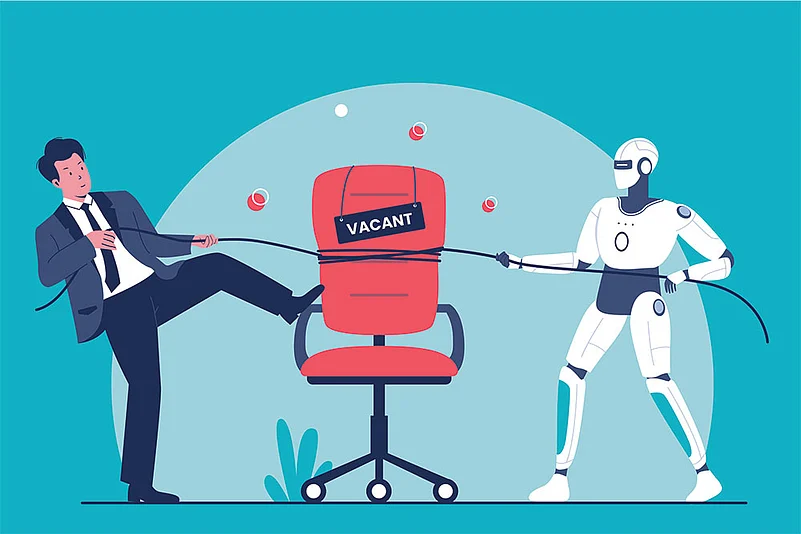AI is developing extremely rapidly, and it is difficult to predict how it's going to play out. What jobs is it going to replace, will it create more jobs than it destroys? Most critically, how will it affect us? The answers are unclear.
But we can look to history and learn some important lessons. Because everything we are going through has happened before. The context and the players are different. But the patterns are similar. And if we don’t understand history, we are condemned to repeat it.
We’ve Been Here Before
The first Industrial Revolution began in Britain in the 1700s with the invention of the steam engine. That innovation led to a wave of mechanisation. It brought massive productivity gains and created enormous wealth.
But the benefits were not shared equally. Technology was used to replace human beings, so the only people who made money were those who owned capital and machines. Skilled artisans were thrown out of work. People were forced to work in unsafe working conditions. Wages were low, life expectancy dropped.
It took almost 100 years for things to improve. Finally, workers started to share in the prosperity. That’s when the middle class was born. But in these 100 years, three generations of workers were crushed. There is a real possibility that the AI revolution can play out in a similar way. Techno-optimists like Bill Gates say that AI will be the great equaliser giving everyone access to incredible expertise, advice, support. Everyone will have access to great doctors, teachers, consultants.
In my view this is far from given. It depends on whether business chiefs and lawmakers largely use AI to augment human capability and share the wealth created or if it will be used mostly to replace people and drive down wages.
But as individuals we can’t wait to see how things play out. We have to take charge of our own destiny. So, what can you do to survive and thrive in this age of AI?
The one thing that's growing faster than anything else is 'problems to be solved'. Every one of them is an entrepreneurial opportunity
Learn to Flourish
I believe there are six things we all need to do to:
Work with AI: The AI genie is out of the bottle, so whether you wish it away or ignore it, AI will only get more capable and deeply embedded into every kind of work. It will replace some roles/jobs, create new ones but will change every white collar or knowledge-worker role.
If you are not already experimenting with AI tools, you are at risk. Because AI won’t replace you, but someone using AI will. If you are ignoring it, you are destined to fail. If you are afraid that AI will take your job, learning to use it is the best strategy.
Be More Human: We can’t compete with machines for some things and we shouldn’t even try. What we can do is become more uniquely human. There are certain qualities that are deeply human and it will be a long time before machines catch up.
One is empathy. Then there’s collaboration. As long as there are people in workplaces and in society, our ability to work with other people will remain a key advantage.
Leadership is the superskill in this century. Inspiring people to come together voluntarily to accomplish something or solve a problem is not something that will be automated any time soon.
And finally, storytelling—something no other species does. The ability to imagine, craft a narrative and get others to believe is a unique human superpower.
Build Adaptive Skills: The world will change more in this century than in all of human history. Think about all the change that is happening around us, in our companies, in India, globally.
So the ability to adjust to and thrive in completely new situations is critical for survival and far more important than technical skills such as design, coding or writing.
The only way to develop a growth mindset and adaptive skills is through challenging experiences that are outside your comfort zone. These are ‘crucible experiences’ and they make us tougher and more resilient.
An Entrepreneurial Mindset: In the 21st century, entrepreneurship is not a career choice; it is a survival skill that every single person will need. The reason is simple. The idea of stable jobs leading to stable careers is obsolete; there is no such thing as a stable job anymore.
The good news is that even as jobs are becoming scarce there are more opportunities. In fact, the one thing that’s growing faster than anything else is 'problems waiting to be solved'. And every one of them is an entrepreneurial opportunity.
Hedge Against Job Loss
Strive for Excellence: In the age of AI, mediocrity is (professional) death. If you are not excellent at what you do, you will be quickly replaced by someone more dedicated, focused, competent using AI. There is less and less room for anyone who isn’t both competent and intense about what they do.
So how do you avoid mediocrity? You need to find your edge. A simple way to do that is by using the Japanese idea of ikigai, but with a twist. You need to figure out four things: what you love, what you’re good at, what AI is not yet good at and what the world is willing to pay you for. And then try to construct a professional life that is at the intersection of these things.
Build Safety Nets: We are living in what’s called a VUCA world—volatile, uncertain, complex and ambiguous. What is certain that everyone of us will have to live through multiple shocks that include disruptions at work, pandemics, conflict, extreme weather events. The key is to prepare yourself before the next shock hits.
Start by building financial assets and multiple income streams. Equally important is building social capital, which includes a strong professional reputation, a good personal and professional network, and meaningful relationships with people who matter. And finally, create a personal board, i.e. a small group of trusted individuals who will offer honest advice and support when you need it.
None of us knows exactly how the AI revolution will play out. But we do know that we can’t sit this one out. Whether you’re just starting out or have been in the industry for years, you have a choice.
You can wait and react, or you can adapt and lead. In this AI age, the people who will thrive aren’t the ones with the most experience or the most degrees—they are the ones who keep learning, adapting and moving forward.
The writer is former co-chairperson, Infosys and a social entrepreneur











